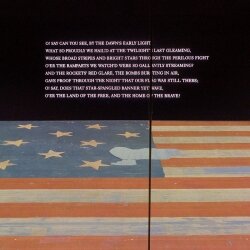Song butchers: Let's 'play ball' with the original
You love to sing this part, I know you do:
“O, say does that star-spangled banner yet wave,
O’er the land of the free and the home of the brave?”
I don’t care whether your bumper still sports a McCain-Palin sticker or a beat-up “Change We Can Believe In” declaration, your heart beats faster and you feel great when you’re surrounded by a crowd of your fellow Americans, all singing the same tune – for once. Nothing says “We’re all in this together” quite like joining our voices in song.
And whenever it’s time to “Play ball!” we get another chance to experience this venerable ritual. Well, in theory, anyway.
Provided it’s presented in the right key, we Americans are happy to participate in the singing of The Star-Spangled Banner. And, oh, what a unifying event this could be, now that we have polarized ourselves into red people and blue people and political discourse rapidly degenerates into “I’m right and you’re an idiot.”
Alas, this therapeutic opportunity has been snatched away from us, right when we need it the most. Over the past several years, our ritual sing-along has been hijacked by soloists who apparently attended the Mariah Carey school of vocal interpretation, because they warble our national anthem as though it were a torch song.
(I don’t think national anthems are treated this way in other countries. Have you ever heard a melismatic, Whitney-Houston-style rendition of God Save the Queen? Neither have I.)
There is a place for this sort of ornamentation in singing. In Italian opera, a coloratura soprano will stray delightfully from the composer’s notation in order to express emotion and add personality to the performance. Jazz diva Ella Fitzgerald entrances us with complex scat detours above and beyond what the composer wrote. And then there’s Ms. Carey and a host of other pop singers who exude passion and longing with this style of singing.
Here’s the problem: Attempting to sing along with the national anthem when the soloist deviates from the score is like trying to follow along with a dance partner who, in the middle of your waltz, starts doing back-flips and cartwheels. About all you can do is give up and say, “Well, apparently this dance doesn’t include me.”
If you want people to participate in communal singing, you lead them in a note-for-note rendition. If I wanted to lead you all, dear readers, in singing, say, Old MacDonald Had a Farm, I would stick to “Ee eye ee eye oh!” and not go off into the weeds by singing, “Ee eye [whoa oh oh!] ee eye [unh unh unh!] oh!”
I got to thinking about all this back on Patriots’ Day weekend, while attending a Red Sox game at Fenway Park. There was no way to sing along with the meandering rendition of The Star-Spangled Banner, but you should have heard everyone united in belting out Take Me Out to the Ballgame and Sweet Caroline, and both of those tunes were presented in a straightforward, note-for-note way. Apparently, the impulse to unite in song is alive and well.
Coincidentally, while mulling over my Fenway Park experience last week, I came across a YouTube video that’s been making the rounds for some time now. Maybe you’ve seen it: It’s a recording made at Fenway Park, on Disability Awareness Day, of a developmentally disabled man attempting to sing, a capella, our national anthem.
Much to his credit, this soloist was singing the song straight, just as it was written. People were listening quietly, a habit we’ve fallen into thanks to awkward experiences encountered while trying to follow the usual vocal gymnasts.
When the disabled man loses his composure and has trouble continuing the song, the crowd helps him out by suddenly singing The Star-Spangled Banner along with him – and I’m telling you, that upwelling of supportive voices from everyone in Fenway Park would make an anarchist weep.
Think back: when was the last time you got to sing along with The Star-Spangled Banner? Since we are both free AND brave, let’s raise our voices in protest, confront these soloists and say: “Remember, this song is not about you – it’s about us. Don’t butcher it.”
~
From her home in Free Union, Janis Jaquith pines for baseball.
